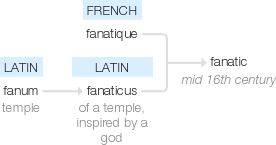Fanatic
mid 16th century (as an adjective): from French fanatique or Latin fanaticus ‘of a temple, inspired by a god’, from fanum ‘temple’. The adjective originally described behaviour that might result from possession by a god or demon, hence the earliest sense of the noun ‘a religious maniac’ (mid 17th century).
wiktionary
First attested in 1525. From Latin fānāticus(“of a temple, divinely inspired, frenzied”), from fānum(“temple”). Influenced by French fanatique.
etymonline
fanatic (n.)
1520s, "insane person," from Latin fanaticus "mad, enthusiastic, inspired by a god," also "furious, mad," originally, "pertaining to a temple," from fanum "temple, shrine, consecrated place," related to festus "festive" (see feast (n.)). Meaning "zealous person, person affected by enthusiasm" is from 1640s. As an adjective, in English, 1530s, "furious;" meaning "characterized by excessive enthusiasm," especially in religion (of Nonconformists), is from 1640s.
A fanatic is someone who can't change his mind and won't change the subject. [attributed to Winston Churchill]
